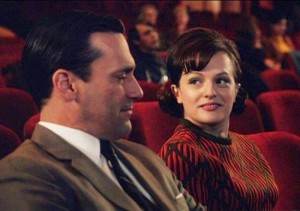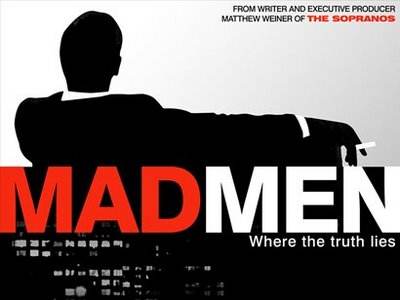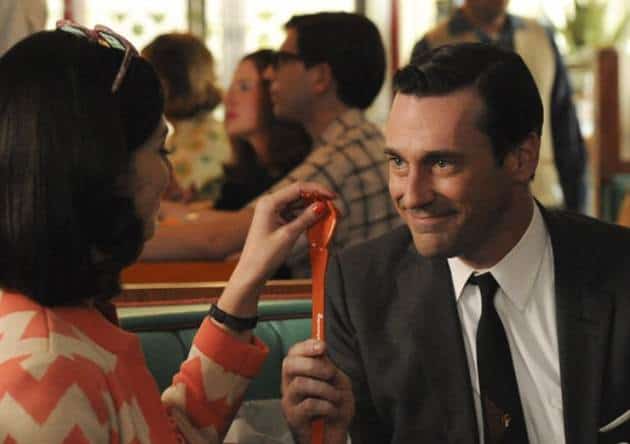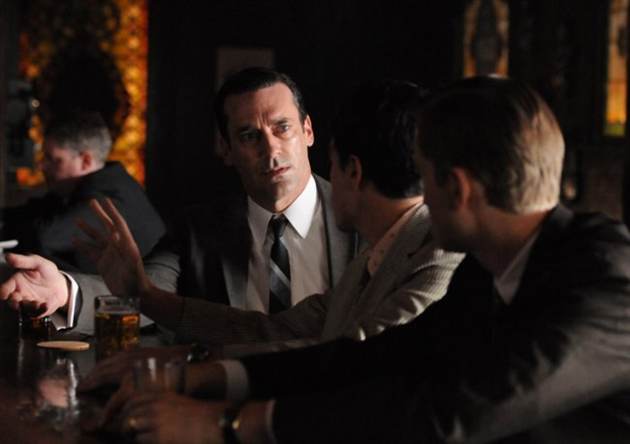
"I hear this is almost as funny as 'It's a Mad, Mad, Mad, Mad World'."
There are a number of nominees for the titular Ghost Who Walks in this episode–most notably the sorely missed Lane Pryce. While cheap dramatics have never been Matthew Weiner’s métier, I wondered how directly he would approach the aftermath of Lane’s workplace suicide–histrionics are difficult to avoid in these situations but to avoid it altogether would be an oversight. Weiner leans toward the latter, which is admirable and befitting the death of a tightly-wound Brit like Lane, but oblique references to Pryce around the water cooler (and the icky matter of who might take over his office) helps to give Sterling Cooper Draper Pryce a very haunted feel.
Even more startling is an almost honest-to-goodness phantom in Beth Dawes, Pete Campbell’s married fling. Her short-term memory-wiping electroshock treatments leave a placid shell of a woman in place of the placid miserable one that Pete originally fell for. If Beth’s character was anything more than a reedy-voiced cipher, this might have had more dramatic heft, but serves the bigger goal of underscoring the erosion of Pete’s belief that he has everything that he wanted and that it is enough (although that was easily covered by Trudy’s acquiescence to Pete’s desire for an apartment in Manhattan–certain to be a millstone around Pete’s neck in the coming seasons).
Megan Draper seems another likely choice–her fall into bald-faced careerism that allows her to lean on Don’s influence to get her a commercial job is not only an action that hollows out her artistic ambitions in favour of recognition, but it also neatly paves the way for a return of the old Don Draper.
Don is a fine choice as the season ender’s phantom: much has been made about the closing minutes of this episode and rightly so. Don is wounded by the loss of Lane and his hand in it, nicely evidenced by the spectral appearance of his younger brother Adam Whitman. And while many have pointed out that Megan’s actions have lead to Don straying from the matrimonial path–and wisely so, as Don has struggled all season with the belief that she is too good for him, a fact he no longer believes due to her craven manoeuvring–but I think the more likely culprit is guilt. He may have had the rotten tooth pulled, but there is a deeper pain that Don must try to salve, and if he can’t get it through work or at home, he will try to damped the pain through means that have worked in the past, namely between the legs of women not his wife.
Even more likely in my mind as honorary phantom is Peggy Olson. I have wondered how Weiner would handle her exit from SCDP: many have left to return briefly (as people do in real life), but Peggy is different than Paul Kinsey or Salvatore Romano. She’s been integral to the show since the first episode and her arc is just as fascinating as Don’s. The problem is not the fact that she left the agency, which made perfect sense, but how to straddle time and place between two agencies. My sense was that Peggy would drop off the radar this season and at the start of the next only to reappear at SCDP through other means (return of the conquering hero and a battle for control with Don or, even more tantalizing, a return to the SCDP fold having suffered through a whopping failure). The time spent at CGC suggests that we may indeed cut between the two, which could lead to a SCDP/CGC showdown or perhaps another merger. Regardless, I can’t imagine much of a show without Peggy, even if she starts to haunt Don at movie theaters for real instead of bumping into him at a matinee of Casino Royale.
Random thoughts:
- Season 5 has proven to be the most uneven of all so far–I’d like to think it has to do with the lag in production time caused by protracted contract negotiations, but next season will be the true test of whether this has become a fatigued enterprise
- I will wait for the return of Salvatore Romano–but I am growing impatient: I thought we’d see a glimpse of him this year, with American Tobacco no longer a client of SCDP, and thought I’d have my wish when Megan showed up on set for a TV commercial shoot, but no dice: this requires immediate attention (and really, if we can have a return of the insufferable Paul Kinsey, made somehow even more unbearable, then Sal should be close by)
- The finest, subtlest shift in a character this year is Roger Sterling: instead of being just a boozy ring-a-ding-ding wit (as entertaining as that is), he showed real depth this year, from his vulnerability surrounding Pete Campbell’s ascendency to the doors of perception opened by Dr. Leary, Roger has become the least likely character on the show to find himself wanting more and to look inward for an answer
- When did Harry Crane become such a whingeing drip? Is that what happens when you hang around TV executives?
- For all the fury around the use of a Beatles song (with more ink spilled on the quarter million dollar price tag than any thematic reverberations), I found it less of a hair-on-the-back-of-my-neck moment than I would have thought, and pale in comparison with the use of ‘(I Can’t Get No) Satisfaction’in Season 4’s ‘The Summer Man’–when the song kicks in hard as Don steps out onto the hot city streets, the sense of time and place in this show has never been as strong
- This season confirms a long-held suspicion: extended commutes between work and home will lead to an inescapable sense of existential dread
- Pete Campbell needs to take self-defence classes
- Glen Bishop will grow up to be either a serial killer, or worse, an active participant in the Reagan administration: seriously, I like the kid yet I see nothing but tears in his future
- Why do we have to watch thirteen episodes in a row? I know I sound like a crazy person asking for mid-season reruns, but there is a lot to eat at the Mad Men table and an entire season in one bolt is like starting a buffet with a bowlful of wheat germ
- While it’s nice that Weiner has capitalized on Jessica Pare’s French Canadian heritage, why couldn’t someone help him out with the casting of her parents? In the form of Julia Ormond and Ronald Guttman we have a couple that looks, acts and sounds more like European royalty than Canadian upper middle class
 Follow Us
Follow Us




